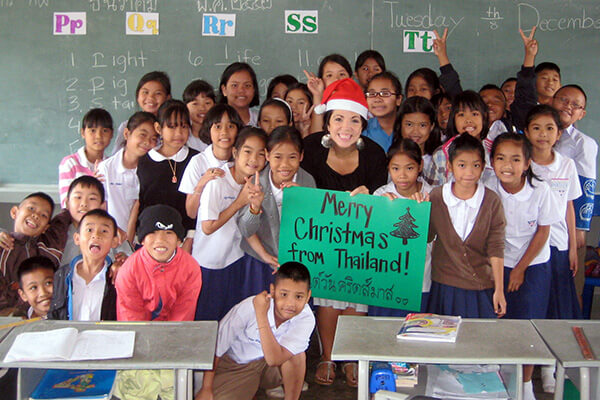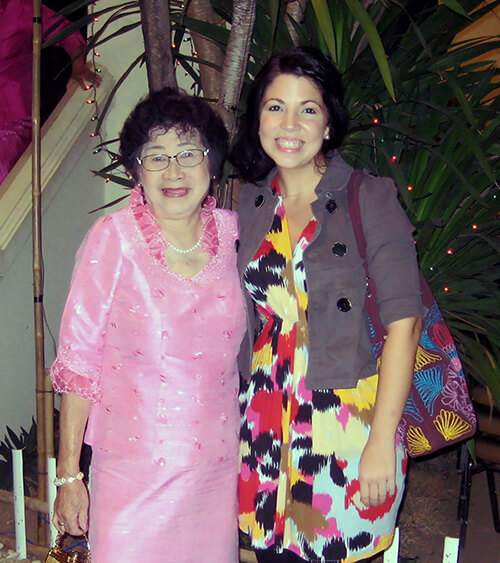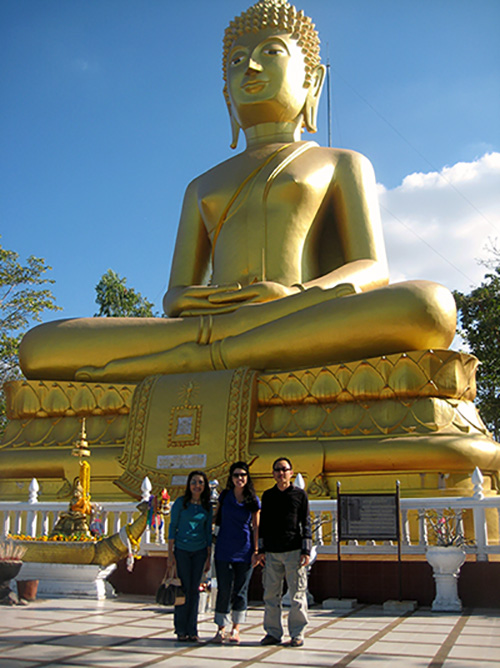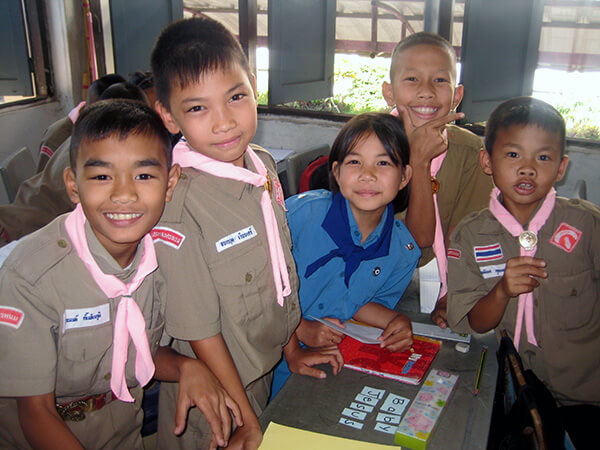Volunteer to Teach English in Northeast Thailand
A Life-Changing Story
Article and photos by Haley Boone

|
|
Students in a classroom with the author who volunteered to teach English in Thailand.
|
Graduate school applications, printouts from different volunteer abroad websites, and my job renewal contract sat on my desk, imploring my attention. Was I ready to begin school again so quickly after spending the previous 18 years of my life as a student? Was I prepared to commit to another year of teaching my wonderful yet challenging third graders in Jackson, Mississippi? Growing up, I always dreamed of taking the time to go and explore the world. It seemed like the perfect time: I was single. I was so ready to go and be part of a grand adventure. I had the support of my family and friends. But was I prepared to give up my salary? Could I sell my car, save up my last paychecks, and go off and work for nothing? Could I leave behind everyone that I loved for an entire year? I decided it was at least worth looking into. I began searching for a volunteer abroad program that supported something I was passionate about, one that I could afford, and one that I would feel confident could support me overseas.
I am sure I looked at millions of websites. Did I want to go through a religious or secular organization? Did I want to work with children or adults? Did I want to teach or try something different? In the end, I realized that I’m very passionate about education and poverty. Then I found WorldTeach. WorldTeach is an organization based at Harvard’s Center for Development. It had been sending volunteers overseas to teach for over twenty years. I knew that any organization supported by Harvard was one that I could trust due to its stellar academic reputation, and to be honest, the experience with Worldteach would look great on my resume when I decide to either go to graduate school or continue my career as a school teacher. I was instantly drawn to the Thailand program for many reasons when I found their website. The program fee was low compared to most other volunteer programs I researched. I would be working with school-aged children in an underdeveloped area of Thailand. The program included full insurance, a round-trip plane ticket, and a field director available in Thailand at all times. After much thought and research, I finally submitted my application, had my phone interview, and was accepted into the inaugural Thailand Year program with WorldTeach (offered only during specific years).
Getting Ready to Go
Packing for a year abroad is a daunting task. From immunizations to visa applications, my “To Do” list grew larger as my departure date loomed. WorldTeach requires that you bring many documents to the field for work permit purposes, which proved to be one of the most time-consuming tasks of my pre-departure weeks. Multiple copies of resumes, diplomas, passport pages, and passport photos are required. Your packing list grows when you consider the different types of weather you’ll experience for a whole year abroad. I also made it a point to bring things that reminded me of home. If I have learned anything abroad, no matter how great I am, there is no place in the world that I’ll ever love more than home. It’s lovely to have a little piece of that on bad days with me. After what seemed to be a thousand “To Do” lists, packing and repacking my two suitcases numerous times, and the many emotional goodbye meals with friends and family, I was ready to cross the Pacific and begin my life as a volunteer teacher in Nakhon Phanom, Thailand.
Hello, Culture Shock
One of the many great things about WorldTeach is that they require a 3-week orientation when you arrive in your country of service. This time was invaluable and helpful in my transition to life abroad. We discussed teaching techniques, went on field trips to learn more about the area of Thailand where we would be living, and bonded as a team of foreigners who came together to travel, teach, and enjoy life in rural Thailand. Among the issues we discussed in depth were patterns in culture shock and how we could recognize them.
I was convinced that, as much as I had traveled before, culture shock was unlikely to affect me. Life in Thailand was nothing short of the grand adventure I had dreamed of for many months before leaving Mississippi. Ultimately, the festivals, delicious foods, and incredibly hospitable people we meet everywhere we visit are proof enough to convince me that I had made the right decision to come to Thailand.
Then, orientation ended. I was surprised when I arrived to discover that I was the only WorldTeach volunteer who would be living with a host family. I was terrified as I drove away from our Orientation site, alone in the car of a friendly mother and daughter. I could not stop imagining the awkward dinner conversations that would happen regularly. What if they didn’t speak any English? Was I supposed to stay in my room or sit in the living room? All these thoughts and more consumed me during that car ride away from the comforts of my WorldTeach family.
The next day was the first day of teaching at Annuban Nakhon Phanom School, an overwhelmingly large school of 1,400 students in grades K-6. Right away, I was pushed onto a stage at an assembly before the entire school and forced to introduce myself. Luckily, the students loved seeing a new, young foreign teacher and welcomed me with their huge smiles. I was told all I was expected to do was observe on my first day of class.
Still, as soon as I walked into each classroom, I was handed the microphone, and the Thai teacher mysteriously disappeared. It was the first of many days at Annuban, and I quickly realized what my field director meant when she explained culture shock as “extreme highs and extreme lows.” During the first couple of months in Thailand, there were many days when thoughts such as “What have I done?” often crossed my mind. Some days, a year seemed like an eternity, and on other really great days, a year seemed like such a short time to spend as a part of this incredibly welcoming culture. It takes a while for any new place to feel like home. Still, I have never been to a place where the local people would do anything and everything to make you as comfortable and happy as possible as I have experienced in Thailand.
Life as a Local
in Thailand
Nakhon Phanom is located on the Mekong River in northeast Thailand, also known as Isaan. I live in the capital of this province, also known as Nakhon Phanom. It’s a sleepy, quaint little town that I quickly grew to love. When I think of Nakhon Phanom, I picture random karaoke parties and aerobics classes beside the river. I think of the night market with the friendliest and most delicious food stalls on this side of the world. It’s a town where you can get anywhere you need to go on foot but also where you will have difficulty walking anywhere without dozens of people offering you a ride on their motorbikes or in their cars. The town boasts excellent restaurants and roads but seemingly has no traffic laws. Nakhon Phanom is, quite simply, the friendliest place that I have ever been.
Being placed with a host family is one of the best things that has happened to me in Nakhon Phanom. From helping me learn Thai to hosting karaoke parties for my friends to being taken on family vacations, I never expected to become a part of something so wonderful when I moved to Thailand. Nothing can replace the sense of belonging to something, and my host family reinforces that feeling daily. Khun Ya, my Thai grandmother, and I have breakfast together every morning. Some of my fondest memories include our time over eggs and rice and our routine of standing arm in the arm-each morning as the Thai national anthem plays. I recommend that anyone traveling overseas consider staying with a host family at some point, if not the entire time. It allowed me to experience Thailand in a way that I’m sure few people ever have a chance to, allowing for total immersion.

|
|
Author with the host family mother in Thailand.
|

|
|
Author standing in front of a giant golden Buddha in Thailand with host parents.
|
Despite its large size, I quickly warmed up to the students and staff of Annuban Nakhon Phanom School. My teaching experience includes a degree in elementary education and a year as a third-grade teacher in Jackson, Mississippi. I loved teaching, but I had grown tired of the endless paperwork and the high-stress level that had become a part of my life. I could write a book on the differences between American and Thai schools. However, Thai schools are fundamentally much more relaxed than American schools.
“You’re tired today? No problem… You no teach!”
“But… what about all of my students? What will they do if I leave?”
Questions like this perplex teachers at my school. Students are treated much more like adults than students in America. I will admit that, at times, I am completely shocked by things I see at Annuban. Students sitting on the ledge of the third-floor railing, tiny first graders climbing the humongous tree in the middle of the playground, and students using sharp knives to cut fruit are all things that stopped me when I first started teaching here. In my typical, arrogant American attitude, I was shocked that the teachers allowed such “chaos” to reign on a campus of students aged 4-12. There were numerous days when I was utterly stunned at what I saw and would leave school so frustrated when things did not go how I thought they should. As time passed, however, I realized that perhaps it is not such a bad way to run a school. My students are responsible. I have not seen a major accident on the playground or the school campus. My students are intelligent, respectful, and completely lovable. Aren’t those the values and behaviors that we want to teach children? I quickly realized that just because I was taught to do things one way does not necessarily mean it is the only way. I will return to America as a more patient and open-minded teacher.
“ABC, Easy as 1,2,3..”
Before leaving for Thailand, I had many goals for being an English teacher. I wanted to be patient, creative, and fun. I wanted to leave Thailand and know that I was leaving behind students who could speak considerably more English than they could when I arrived. However, I did not expect to come and have over 400 students. I had no idea I would be teaching students who could recite the alphabet well but had no idea what sound the letter “D” makes. I was not ready to teach phonics and had no idea how to create engaging lessons for my students when locating construction paper and markers was seemingly impossible. All teaching supplies I brought were either too advanced or utterly irrelevant to what I needed. After a couple of weeks of trial and error, I discovered what worked and what would end in what can only be described as a disastrous lesson.
Despite the differences between American and Thai schools, it quickly became evident that some things are relevant in all educational settings. Children need structure and routine. Children need to have fun, or their attention will only stay focused for a short time. The Internet is your friend when teaching, but as much information as it can provide, it will never compare to the invaluable resources your teaching partners offer. I became a teacher because it is something that I can do to contribute to the world around me. I am honestly not sure that there is a better feeling in the world than the one I get each day when I walk into my classes and see the students’ faces light up with excitement to learn English.
Teaching is only as rewarding and illuminating as you make it. It does not take a degree or experience to be a good teacher. It may not even involve being incredibly knowledgeable about your subject. If you want to be a good teacher overseas, just come ready to give it everything you have. Be prepared to do whatever it takes to make sure your students learn what you have come to teach them. Find another way if you teach something one way, and it does not work. If something works with one class, understand it is not guaranteed to work with another class. If you come to teach in Thailand, come expecting the unexpected. It is not rare to go to school to find all of my morning classes canceled because there is a parade the students must attend or a ceremony where they sign a “Get Well” card for the King. It is not rare to walk into my classes and notice that half the desks are strangely empty. Cheerleading practice, field trips to the local temples, and sudden swim days disrupt my courses regularly. Luckily, I quickly adopted the Thai slogan of mai pen rai (no problem) and adapted to the relaxed lifestyle that I have come to love in Thailand.

|
|
Some of the smiling and enthusiastic young Thai students in the author's classroom.
|
What You Should Remember Before Volunteering Abroad:
-
They recommend immunizations for a reason. Remember to visit your doctor before you leave, and it is best to do it well in advance of your departure date, as some vaccinations require multiple shots.
-
Do your research. Find an organization that works for you based on your interests, the time available to travel, and their support. You will find many options but do not choose one until you are confident it’s a group you can trust and will take care of you while overseas.
-
Go with an open mind. Every country is entirely different, and if you expect things to be a certain way, you will most likely be disappointed. Be ready for an adventure. Be prepared for change.
-
Find out as much as you can about the culture of the country where you will be living. This will make your life much easier when it finally comes time to start packing. Check into things like the climate, how the local people dress, and the local food. You will be glad when you arrive to be somewhat knowledgeable about what you are eating and that you did not waste space packing things that you will never use.
-
Begin learning as much of the language as you can. The people you meet in your country will be impressed by your desire to be a part of their culture. They will be more open to speaking English with you if they see that you are not afraid to try their language, even if you often make mistakes.
Once You Arrive, Do Not Forget:
-
To be culturally sensitive. In Thailand, I can wear shorts in Nakhon Phanom, but if I visit friends in villages, it is considered inappropriate. I am not a Buddhist, but I know that I should not touch the monks and that I need to show proper respect when I encounter them. Take the time to learn about the culture, and then make sure that you put the things you learn into practice.
-
That it is acceptable to bring a little bit of your culture with you. My host family loves to hear about my family's traditions back home and what we do in Mississippi. I often try to cook dishes I eat back home for my host family, such as queso dip and spaghetti. Even though they rarely like it, it is still a chance for them to understand more about me. Pictures, music, and books are a great way to share your culture with those you meet.
-
To keep your family and friends back home updated on what is going on in your life. I would only make it in Thailand with the support of the people I love back home. While they may never fully understand what I experience here in Thailand, it is so lovely to talk to them about things I am going through. Do not isolate yourself from people just because you are very far away. You will need them often overseas, and you will need them even more when you go home again.
-
That sensitivity (as we define it) only sometimes exists in other countries. Thai people are brutally honest. If they think you are fat, they tell you. If they feel your nose is oddly shaped, they will recommend a place for you to go and get a cheap nose job. Do not take it personally.
-
To have fun! Take every chance you get to try new things. Travel around the country and explore what’s around you. Please do not take the things that become a part of your daily setting for granted because before you know it, you will be heading home on an airplane. Make sure you leave without regrets!
Haley Boone is from Madison, Mississippi, and graduated in December of 2007 from Mississippi College with a degree in Elementary Education. Before volunteering with WorldTeach, Haley taught third grade in Jackson, MS, and has volunteered abroad in India, China, Great Britain, and Kazakhstan.
|
